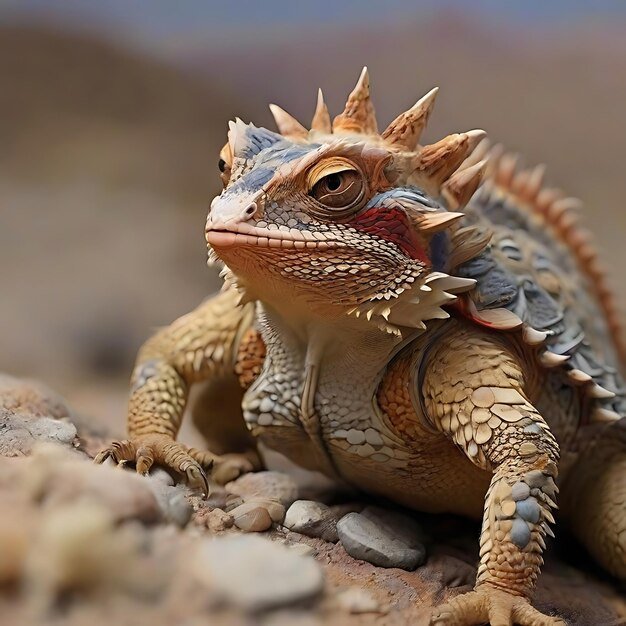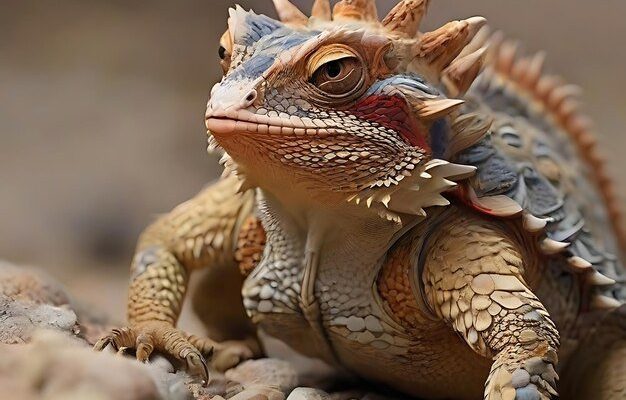
Unlike the flashier reptiles, horned lizards aren’t just about looking cool with their funky spikes and flat bodies. They can actually showcase some clever adaptations that help them survive in their often harsh desert habitats. So, let’s dive into the wild world of horned lizards and explore their cognitive abilities and behaviors like we’re chatting over coffee. Who knows? You might walk away with a newfound appreciation for these little guys!
What Are Horned Lizards?
Horned lizards belong to the Phrynosomatidae family, which includes several species. They’re mostly found in North America, thriving in arid environments. You might recognize them by their distinctive flattened bodies and spiky scales that resemble armor. Honestly, they look like they’ve stepped right out of a fantasy movie!
These lizards have a unique defense mechanism: when threatened, they can puff up their bodies to appear larger and more intimidating. Some species can even squirt blood from their eyes! It’s like their version of a superhero power. This adaptation not only helps them avoid predators but also showcases an interesting level of *behavioral intelligence*.
Just as humans adapt to their surroundings, horned lizards have developed specific traits that help them survive. For example, they’re experts at camouflage, blending in with rocks and dirt to hide from danger. This clever ability is one of the many tricks in their cognitive toolbox.
Cognitive Abilities of Horned Lizards
You might be surprised to learn that horned lizards possess various cognitive skills that aid their survival. While they may not solve puzzles like some mammals, their intelligence shines through how they navigate their environment. They’re excellent at learning from experiences, which is a sign of their cognitive capabilities.
One fascinating aspect of their intelligence is their ability to recognize patterns. For instance, they can remember the appearance of predators and change their behavior based on past experiences. If a particular bird has tried to catch them before, they’ll likely be more cautious when they see something similar again. This kind of learning helps them avoid becoming someone’s lunch!
In addition, horned lizards exhibit a level of problem-solving. For example, if a lizard finds a food source that’s hard to reach, it might try different methods to get to it. This ability to experiment and adapt is a clear indicator of cognitive flexibility, something we usually associate with more complex animals.
Behavioral Traits of Horned Lizards
Behaviorally, horned lizards are quite unique. They have a variety of social behaviors, which can seem complex for reptiles. For instance, they have a hierarchy based on territory, where more dominant individuals obtain better access to resources. In a way, they’re like a small community, navigating social dynamics you wouldn’t expect from a creature that appears so solitary.
During mating season, male horned lizards will perform elaborate displays to attract females. This can include head-bobbing and puffing up their bodies to appear more impressive. It’s their way of showing off, much like how peacocks flaunt their feathers! These displays require not only instinct but also an awareness of social cues from potential mates.
Moreover, horned lizards have their version of friendships. They sometimes bask together, sharing warmth and protection. This suggests they can develop bonds with others in their species, showcasing a social intelligence that people often overlook in reptiles. They might not be social butterflies, but they sure have their quirks!
Survival Techniques
Horned lizards are masters of survival, employing various techniques to evade predators and thrive in their environments. As we touched on earlier, their camouflage skills are crucial. By blending in with their surroundings, they become nearly invisible to predators. It’s like wearing invisibility cloaks made from earth tones!
Another essential survival technique is their diet. They primarily eat ants, which they can find in abundance in their habitats. Their hunting strategy involves a quick flick of the tongue to catch these fast-moving insects. You might think that’s just instinct, but there’s a level of planning involved here—especially when they need to decide the best time and place to strike.
Lastly, their ability to regulate body temperature is key to their survival. Horned lizards need to manage their heat intake carefully, often basking in the sun during the morning or finding shade in the heat of the day. This behavior indicates an understanding of their environmental needs and is a testament to their cognitive functioning.
Myths and Misconceptions
Horned lizards often face various myths that can misrepresent who they are. One common misconception is that they’re mindless or overly simplistic creatures. In reality, they have more depth to their behavior and cognition than many people realize. Comparing them to other reptiles, they show remarkable adaptability and intelligence.
You might have heard that horned lizards are dangerous or aggressive because of their spiky appearance. However, they’re actually quite docile and prefer a strategy of hiding or blending in rather than confronting threats. They would rather play the “quiet game” than the “fight game.”
Another myth is related to their defense mechanism of squirting blood. While it might sound brutal, this behavior is more about evasion than aggression. It’s a clever trick to confuse predators, allowing lizards to escape. Understanding these myths helps us appreciate their place in the ecosystem and recognize them as intelligent beings.
What Horned Lizards Teach Us About Intelligence
Studying horned lizards can give us insight into the broader aspects of intelligence in the animal kingdom. They challenge our perceptions of what it means to be “smart.” Their combination of survival skills, social behaviors, and learning capabilities suggests that intelligence can manifest in various forms, even in creatures that don’t fit our usual definitions.
One of the great takeaways from studying horned lizards is understanding adaptability. In a world that is constantly changing, their ability to learn and adjust serves as a reminder of the importance of being flexible. They remind us that intelligence is not just about problem-solving; it’s about resilience and adaptiveness.
In conclusion, horned lizards showcase a unique blend of cognitive abilities and behaviors that intrigue researchers and nature lovers alike. They may not be as flashy as some other reptiles, but their intelligence and adaptability are impressive in their right. There’s a whole world of learning waiting for anyone curious enough to look!
So, next time you see a horned lizard sunbathing on a rock, give it a little nod of respect. These little creatures carry a wealth of wisdom in their sharp spines and clever strategies for survival. After all, brains and brawn come in all shapes and sizes!

